Rome bids for 2024 Olympics. Prime Minister Renzi announces "We want to win"
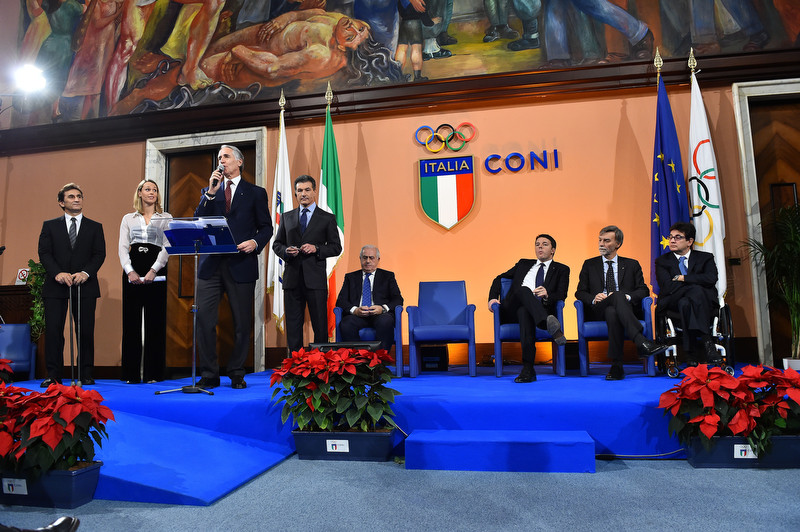
The President of CONI, Giovanni Malagò, on stage with the Secretary General, Roberto Fabbricini, opened the day with a message of gratitude dedicated to all the members of the great sports family. "We are proud to celebrate such a number of champions, who contributed to show the successful face of the country with their victories and their example. Now, as never before, has this event become so important, especially in consideration of the current anticipations. Today, dear Premier, we have reunited our entire world in a sport celebration for all the athletes that made Italian sports so great in the last season. The Golden Collars are always very much appreciated, even by people accustomed to stand on world championship podiums and to participate in Olympic competitions. Thank you, Matteo: even in this times you have always been very close to our world, and to Undersecretary Graziano Delrio, with whom we have a friendship that goes beyond official relations". Malagò concretely summarized the concept by revealing an upcoming legislative measure concerning the resolution of the problem linked to the Federations included in the ISTAT list. Afterwards, he greeted all the attending champions devoting a special thought "to two of them: Sara Simeoni and Armin Zoeggler. Long live Italian sport". Andrea Fusco, who hosted the event along with two exceptional protagonists, Federica Pellegrini and Alex Zanardi, left then the floor to the First Minister, Matteo Renzi.
"For someone like me, who is quite hopeless at playing sports, being here is truly great. I started playing with the balls in Malago's office. That is the best office in the world, as Disneyland would be for a kid. I would not be able to perform a triathlon like the one performed by Alex Zanardi even if I was in a motorboat. Any new athlete knows that his adventure will not be an easy one: if he were looking for easiness, he would not have chosen that career. Therefore, with that same spirit we will be close to CONI from now to September 2015 to present our bid to 2014 Olympic Games. An application that fills our heart with emotion, pride and hardships. We will have the most advanced facilities in the world, thanks to our Made in Italy. We will be at the forefront of expenditure control for all the technical structures, and we will have a cutting-edge project, obviously focused on Rome. Then, it will be up to CONI and to the technical team to be able to widen the proposal put forward by the IOC. Imagine you can have a range that allows your bid to be reliable and ultimately to win. With all due respect to De Coubertin" continued the First Minister, "we are not making this bid to participate, but to win, and we will do that along with the cities that can help this project the most, starting from the territory around Rome, and then Florence, Naples and Sardinia. The detailed procedures of this will be in the availability of the organizing committee that will be instituted in January, and will be under the supervision of CONI and its President Giovanni Malagò. We will do everything it will take to make this project, that will be voted in September 2017, a project to be proud of. We might not win, we might not make it, and we might give up. It might happen. Nevertheless, when we see that we might not make it, is when we must find a new moment of life, and be determined and ready. You all know that the commitment in every single point is what makes each of us people, and not numbers. The Italian government altogether is ready to do its share. We do not want this to be an unsubstantiated project, made up of large infrastructure and big dreams, but a project made of great people, the athletes: you, who succeeded in winning medals, but also the many unknown athletes, who train themselves in dilapidated gyms in our suburbs and who might not make it to a medal, but who demonstrate with their enthusiasm that sport in Italy is more than a mere activity; it is a way of life, a way of looking at the future, a future made of pride and determination. I thank you for all of these reasons, and I tell you that we are here. I do not know if we will make it. I think so, I am very optimistic, but above all I know that this is one of the best things that we can do, because we do it for our children and for our country". The awards ceremony then began. Here is the list of the awarded people, including 18 athletes, 7 sportsmen, 21 clubs and military sporting groups and a Regional Committee.
GOLD COLLAR
Vincenzo Nibali (cycling), Giacobbe Fragomeni (boxe), Clemente Russo (Boxing), Arianna Errigo and Rossella Fiamingo (Fencing), Anna Cappellini e Luca Lanotte (Figure Skating), Roberta Vinci, Flavia Pennetta e Francesca Schiavone (Tennis), Petra Zublasing, Giovanni Pellielo and Jessica Rossi (Shooting), Silvia Marangoni (Artistic Inline Figure Skating), Antonio Cairoli and Kiara Fontanesi (Motocross), Alex Carella (Powerboat), Assunta Legnante (Paralympic Sport), Luca Cordero di Montezemolo, Giacomo Agostini and Alfredo Martini, Pier Luigi Marzorati, Gugliemo Moretti, Bruno Pizzul, Tito Stagno.
Clubs and Military and State Corps S.A: Tiro a Segno Nazionale Sezione di Parma A.S.D., Ginnastica “Francesco Petrarca” 1877, Fratellanza Ginnastica Savonese A.S.D., Canottieri Lario “Giuseppe Sinigaglia” A.S.D., Canottieri Lecco A.S.D., Tiro a Segno Nazionale Sezione di Bari A.S.D., Ginnastica Fortitudo A.S.D., Società Canottieri Milano A.S.D., Unione Ciclisti Trevigiani A.S.D., Fanfulla 1874 A.S.D. di Ginnastica e Scherma, CC Napoli A.S.D., Scherma Jesi, Fiamme Gialle, Carabinieri, Polizia di Stato - Fiamme Oro, Esercito,. GOLD STAR: Forestale, Fiamme Azzurre - Polizia Penitenziaria, Marina Militare, Aeronautica Militare. TROPHY OF CONI 2014: CONI Lazio
Malagò: “Proud of Renzi’s words”
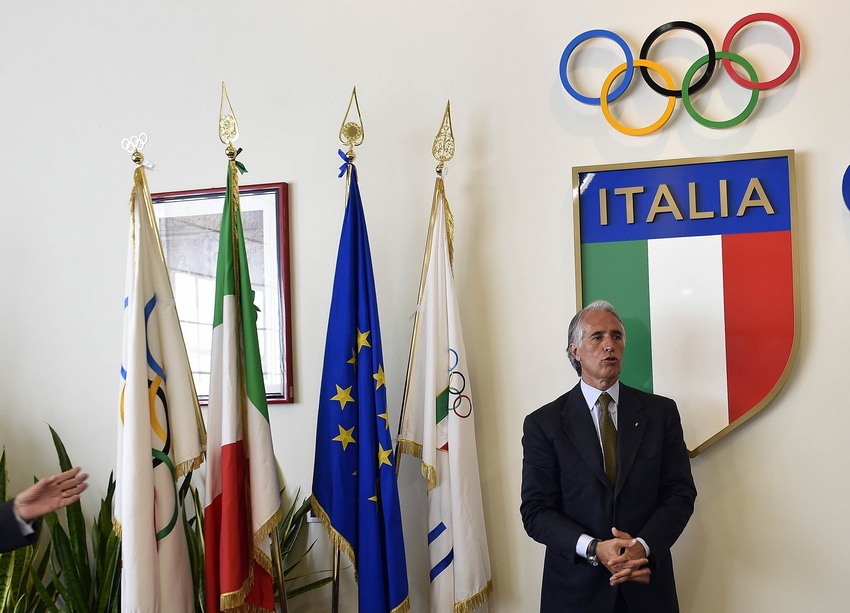 “Renzi’s words make Italian sport proud. Tomorrow will be an important day for everyone: for Rome, for Naples, for Florence, for Sardinia, but also for Northern Italy, for which Milan represents a fundamental reference point. Compatibly with the flexibility that the CIO adopted with the new regulations approved in Monte Carlo this week, we can finally dream big together: Coni, the Government, Renzi and Italy”.
“Renzi’s words make Italian sport proud. Tomorrow will be an important day for everyone: for Rome, for Naples, for Florence, for Sardinia, but also for Northern Italy, for which Milan represents a fundamental reference point. Compatibly with the flexibility that the CIO adopted with the new regulations approved in Monte Carlo this week, we can finally dream big together: Coni, the Government, Renzi and Italy”.
Conference on the specific characteristics of sport and young people training in the EU. Malagò: "Uphold the breeding grounds"
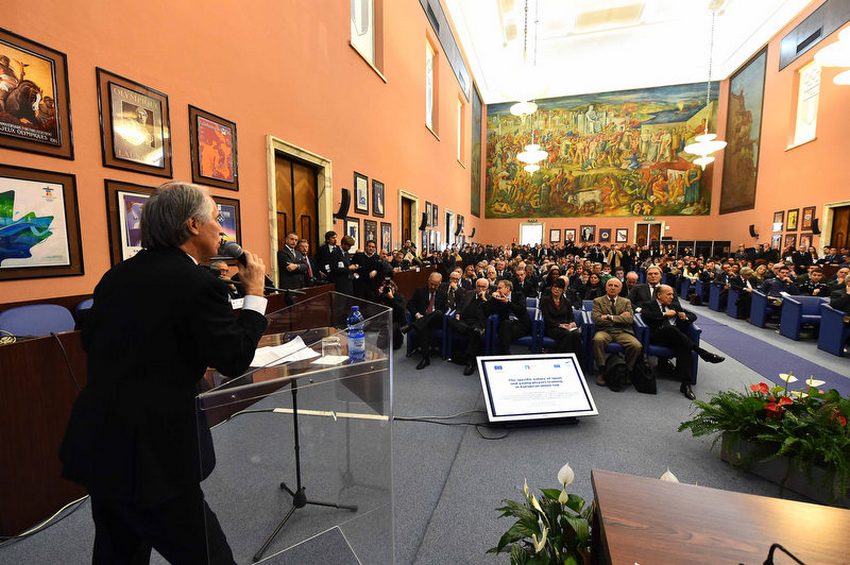 A conference on "The specific nature of sport and the young athletes' formation in EU law" took place this morning in the Hall of Honor of CONI. The event, organized by CONI in collaboration with the Department of Regional Affairs, Autonomy and Sports of the Presidency of the Council of Ministers and co-funded by the European Commission in the context of the six-month Italian EU Presidency, started with a greeting by President Malagò. "We are honored and proud to be the hosts of this event which represents a major concern of our world. CONI is committed to promoting the diffusion of sports in the whole country, and our model is often envied and imitated abroad. A market research provided by my Danish colleague revealed that CONI is the most authoritative Committee in the world, also thanks to the former Presidents. The social function of sports is becoming more and more fundamental, especially in the Old Continent, the cradle of the movement. We have to deal with the role of young people, especially because they have to become the real protagonists. We now suffer an infrastructural and educational gap compared to the rest of Europe and to the world, a problem that is reflected in the data about sedentary lifestyle. Many disciplines are under attack on the subject of the breeding grounds: football has recently defined a perimeter within which to operate but there are many other sports that risk being penalized, a possibility that may affect the competitiveness of the National teams. We have to find a system to regulate the activities and uphold this field, and give it as a legacy to the future generations".
A conference on "The specific nature of sport and the young athletes' formation in EU law" took place this morning in the Hall of Honor of CONI. The event, organized by CONI in collaboration with the Department of Regional Affairs, Autonomy and Sports of the Presidency of the Council of Ministers and co-funded by the European Commission in the context of the six-month Italian EU Presidency, started with a greeting by President Malagò. "We are honored and proud to be the hosts of this event which represents a major concern of our world. CONI is committed to promoting the diffusion of sports in the whole country, and our model is often envied and imitated abroad. A market research provided by my Danish colleague revealed that CONI is the most authoritative Committee in the world, also thanks to the former Presidents. The social function of sports is becoming more and more fundamental, especially in the Old Continent, the cradle of the movement. We have to deal with the role of young people, especially because they have to become the real protagonists. We now suffer an infrastructural and educational gap compared to the rest of Europe and to the world, a problem that is reflected in the data about sedentary lifestyle. Many disciplines are under attack on the subject of the breeding grounds: football has recently defined a perimeter within which to operate but there are many other sports that risk being penalized, a possibility that may affect the competitiveness of the National teams. We have to find a system to regulate the activities and uphold this field, and give it as a legacy to the future generations".
The opening of the conference, reserved for institutional greetings and moderated by Francesco Soro, Head of Legislative Affairs and Activities of the Bureau of CONI, continued with the greeting of the Undersecretary of State in charge of sports, Graziano Delrio. "We are happy to conclude these six months of Italian EU Presidency with an initiative aimed at young people and dedicated to the principles of autonomy and responsibility. The Italian government has put sports at the center of its efforts in this semester. Politics must respect the autonomy of sports, which also represents the country's culture. For this reason, during the past six months we have emphasized a number of concepts: sports as an economic driver and as an educational tool, we have directed our efforts to developing motor activity in the schools. Sport is different from the other activities and must be considered in its own specificity. We must set a protocol for youth players grown in the breeding grounds while trying to enhance our youth sectors, without betraying EU free movement regulations".
Jens Nymand-Christensen, Deputy Director-General, DG Education, Culture, Youth and Sport of the European Commission, represented the official views of the EU. "These six months of Italian EU Presidency has been a very important period, which achieved an incredible success. It is very important to notice the fact that the responsibility for sports has been formally assigned for the first time in the portfolio of a Commissioner, Navracsis. There are many unemployed young people all across Europe, and in some countries, they are more than 50%. When we talk about employment, we often forget sports. We know that 2.1% of the workers in the EU are athletes, and we must remember that. We must help young people to find employment. Sports have a fundamental role in our society, in terms of education and development. In 2009, the Treaty of Lisbon introduced for the first time the word 'sport' in a document on the functioning of the EU. Sports can receive a special treatment without violating European rules. We are talking about young people and breeding grounds: there can be no discrimination in terms of free movement of workers in the EU, but we can grant sports a flexible interpretation of those rules. We should encourage these measures to adopt ambitious policies, for those exceptions represent an opportunity. We hope to find solutions aligned to current needs".
Mario Pescante, Member of the IOC, spoke about the stages of the relationship between sport bodies and the EU. "This day can represent the resume for dialogue on the specific nature of sports and its autonomy towards the European Commission. 19 years have passed since the Bosman ruling. Starting that day, the dialogue has been fragmented, almost verging on incommunicableness. A million and 350 thousand European citizens revolve around the world of sports, and that is why the dialogue must be maintained. And since we pursue the same values and the same goals, this is an easy task in sports. There are many Italian federations, 47 at European level, which are subject to infringement procedures for violating European standards. The Union has regulated sports over time by applying rules provided for other sectors. We demand the recognition of a specificity. After years of debate, in the Treaty of 2009 the IOC has obtained the inclusion of the word 'sport' in the functioning of the EU, but that did not improve the situation. We must develop a European dimension of sports. We must overcome the limits laid down in the Treaties. Specificity, independence and autonomy are scared concepts. Nelson Mandela asserted that sports have the power to unite people. It can create hope within despair. We demand respect for the values that we represent, for the fight against discrimination, for the protection of human rights. Sport promotes universal values: let us create a global village that would be just a dream without us".
FIRST SESSION – Sports in the European system
Giulio Napolitano, Professor of Administrative Law at the University of Rome and President of the Sports-Justice Reform Commission, moderated the next part of the discussion. "We must strive to find a European framework for sports. Autonomy does not live in isolation, it needs great cooperation".
The opening was followed by seven speeches on the subject of sports in the European system. Santiago Fisas Ayxelá (Member of the European Parliament, former Minister of Sport in Spain): "I know we have two limits: the first one is subsidiarity, while the second is related to the specific nature of sport. Sport is not above the law, so we must find a solution that permeates both dimensions. We need those clear rules to be compliant with the law". Robert Siekmann (University of Rotterdam): "Sporting rules have nothing to do with politics. The specificity of sport is the mother of all battles. Knowing the regulations means improving the situation, comparing, and making comparative studies across disciplines to achieve a growth. The legislation is based on what happens on the playing field. Those rules represent another important element of the study in demonstrating the specificity".
Walter Veltroni (Honorary President of the Italian Basketball League): "My Italian knowledge about Europe reaches the United States of Europe, in an extensive concept of Community rights protection. I believe that we should go even further, aiming for greater integration and flexibility, especially in the fields of culture and sports. This is to allow protection of the breeding grounds, which is pursued through infringement procedures. Nowadays there is a conjunction that creates a crisis of youth sectors, and that is a problem for the whole of Europe. We are likely to have a decline in the number of children who play sports. We must encourage sport clubs to acquire young players, and we have to find a way to harmonize this principle without breaking the rules. Maybe we need temporary standards: this would be what I call flexibility. Sport levels are lowering: we import many American players, but their level is not higher than the level of the youth that can grow and improve in our country. This is what we demand to Europe: recognizing flexibility and specificity to deal with this emergency". Franco Frattini (President of the High Court of Sports Justice, former European Commissioner for Justice): "I also wish to speak of United States of Europe. My analysis focuses on the fact that the sooner Europe will decline subsidiarity of organizations, the stronger European political integration will be. The Treaty of Lisbon does not only have flaws, but also some strong points, like the placement of sports alongside education, training and youth. Therefore, according to this interpretation, it is an element to be preserved. We must affirm the principle that the protection of breeding grounds is not discrimination. The creation of a Commissioner for Sport should not dismiss the principle of subsidiarity". Yves Le Lostecque (Head of the Sport Unit of the European Commission): "Sport has a specific nature, as recognized by the Treaty. With regards also to exemptions, because it is not an economic activity. We, the European Commission, are accused of not doing enough for sports, but we have to remember where we came from. At the beginning, this subject was not among the topics concerning us. Ten years ago, there were no funds to deal with sports, while today we have resources and a program. There is no binding legislation, and subsidiarity is the main principle. We must intervene only when necessary. We have a work schedule for sports for the next three years: good governance, anti-doping, rigged matches, gender equality, education and formation. The second tool is the Erasmus Plus, which includes a chapter dedicated to sports. We are at the same time ambitious and modest". Christophe Vedder: "Due to its social educative purpose, the specific nature of sport is undeniable. It embraces various areas, although it is not mentioned in the treaty. The legislation suggests that the specificity must be tracked down in the provisions of the European Court of Justice". Gabriella Palmieri Sandulli (Barrister): "The plurality of legal systems must begin from the concept of specificity of sports, which in turn should be made compatible with the multiplicity of rules. The Court of Justice as a body of laws is connected to competition and free market; the key concepts of proportionality and reasonableness were introduced. This must not be reduced to a series of cases; we must maintain a broad overview. The concept of specificity is declinable, it is a visible and concrete concept, and also takes into account the individual disciplines that deserve adequate and equal importance".
SECOND SESSION – THE UE AND THE FORMATION OF THE YOUNG ATHLETES
The second and final session, moderated by the lawyer Antonio Conte, Member of the Sports-Justice Reform Commission, was opened by the Undersecretary of State responsible for European Affairs and Policies, Sandro Gozi: "This initiative, as part of the Italian EU Presidency semester, means a lot to us. The rules of the sport world are not at issue, what is in question directly relates to the relationship between the competitive sector and the European Union. The creation of a portfolio for the Commissioner is essential to fully implement the concept of specificity of sport in Europe. We must not create restrictions, and a Europe that really wants to develop new policies for sports should consider this aspect. The way of subsidiarity and the social impact are essential in the protection of youth sectors".
Karen Jones (Lawyer and Professor of International Law at the University of Amsterdam): "I think it is important to understand the social aspect of the breeding grounds regulations. Many players are very young, so the educational dimension is very important. It is necessary to train many young people to discover a champion. We need to carefully and individually raise these people, for the development of the community and to ensure a future to those who will not have a future as a champion". Sophie Dion (Member of the French Parliament, Professor): "Formation must be accompanied by an employment contract. We must find solutions that do not create problems nor discrimination at European level: then, subsidiarity takes over. We should not just endure the reality, because other countries are emerging and progressing. It takes a strong political will to protect young people". Jean-Pierre-Siutat (Member of FIBA Europe Board and President of the French Basketball Federation): "Our difficulty is simple: we have to protect National teams. The situation evolved after the Bosman ruling. The budgets range from two to 50 million: the richest teams can go scout players abroad. We must continue training players without protecting them. To be competitive, to continue preparing strong National teams, we have to preserve our youth".
Michele Uva (Director General at the FIGC): "The ability to develop a youth sector is synonymous with operational virtue: an illuminating example is the cantera of F.C. Barcelona, which produces 90% of the players in the breeding grounds. There is a need to invest not just part of the profits, as required by law, but a proportionate share of the revenues, due to the importance of the issue. The youth sector reflects social nature. The youth sector is a major factor of territorial characterization, it is synonymous with a sense of belonging. In football, the UEFA counts the costs for the youth sectors as investments and not as entries in the Financial Fair Play. England has the highest number of foreigners, but the problem of National teams needs to be addressed since it is general. On this field, we should follow the example of Germany. The Italian Federation is working on it: it has introduced in the 25-players shortlists the 4+4 principle: 4 elements raised in Italy and 4 players trained in Italy. The goal, which must be shared and reached by all the institutional components since it is currently prohibited by the Community rules, is to have all shortlists made up of young players coming from the breeding grounds. It is important to create a structure which also includes the alignment of procedures for obtaining citizenship in every country and a uniformity of tax treatment, because there is a higher pressure in Italy. Sports need growth factors born from dialogue. We must restart from the youth sectors".
Stefano Bastianon (Professor at the University of Bergamo): "The concept of specificity is very vague, with no precise definition. We can say that it is a special field because it differs from any other type of activity due to its social dimension. The training of young people is one of the aspects that characterizes the sports legislation in the EU, but it is not always the same according to the specificities of each discipline. Every sports rule is subject to European law, so it is special but in fact is treated as any other sectors. That is why it becomes a political issue". Antonio Naddeo (Head of Department for Regional Affairs, Autonomies and Sport): "Training is essential. In Italy, we have lost the ability to invest in young people, not only in the sports field. We only pursue short-term goals. Our strategy involves directing efforts in education to reverse this trend".
Francesco Soro closed the day, thanking the speakers and the European Commission for their attention towards a central theme in the prospects of sport development, with the objective to continue the political dialogue aimed at achieving a unanimously shared goal.
Carolina Kostner will appear before the National Anti-Doping Court on January 16
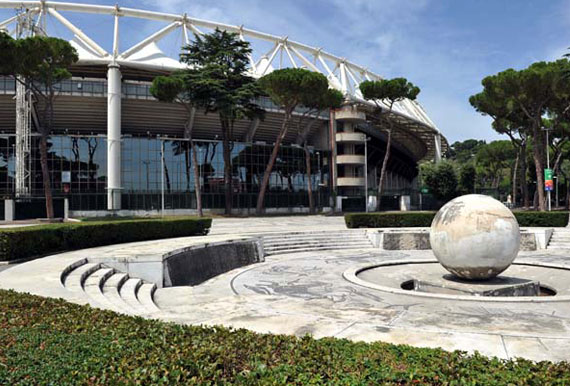 Following the referral of the athlete Carolina Kostner, issued by the Prosecutor's Office on November 28, 2014, the 2nd Section of the National Anti-Doping Court scheduled a hearing for January 16, 2015 at 10:00am.
Following the referral of the athlete Carolina Kostner, issued by the Prosecutor's Office on November 28, 2014, the 2nd Section of the National Anti-Doping Court scheduled a hearing for January 16, 2015 at 10:00am.
The disciplinary proceedings will be discussed in the Conference Hall of the Olympic Stadium in Rome
The specific nature of sport And young players training in European Union law
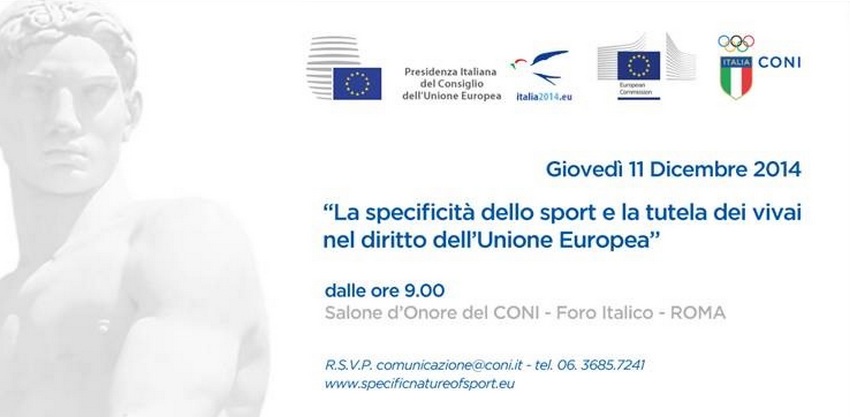 Sport has the power to promote universal values, such as social cohesion, tolerance, and peacekeeping. At the same time, sport is an extraordinarily powerful tool to promote education, health and wellbeing, as well as growth for new generations.
Sport has the power to promote universal values, such as social cohesion, tolerance, and peacekeeping. At the same time, sport is an extraordinarily powerful tool to promote education, health and wellbeing, as well as growth for new generations.
It is on these premises that in 2009 the Lisbon Treaty introduced the word 'sport' for the first time in the Treaty on the functioning of the European Union, by recognising the "specific nature of sport". This represents a landmark in the history of sport, which stemmed from the political will expressed by the European Parliament, in its Resolutions on 13 June 1997 and 13 February 1998.This was followed by the Conclusions of the European Council on 12 December 2008. In the face of the growing interest for sport policies by European institutions and Member States, political debate on sport needs to regain momentum.
In this respect, it is very significant that, for the first time this year, the European Commission has formally assigned a specific mandate on sport within a Commissioner's portfolio, Tibor Navracsics. This indicates that the European Commission, which took office on November 1st, can look forward to the next 5 years as an opportunity to elaborate on the "specific nature of sport". Guaranteeing that said specific nature finds formal acknowledgement in the European law system means guaranteeing that sport can keep contributing to the European policymaking process for social cohesion, economic development and education and, ultimately, to the economic growth of Europe.
The conference of 11th December 2014, organised by the Italian National Olympic Committee (CONI), in collaboration with the Presidency of the Council of Ministers - Department for Regional Affairs, Autonomies and Sport, and co-financed by the European Commission, within the Italian Semester of the Presidency of the Council of the European Union, therefore aims to offer a debating platform on the specific nature of sport, with specific reference to the training of young athletes.
Investing in the promotion of sport among young people, with particular reference to home-grown players, is paramount to trigger that virtuous circle that links together professional sport and grassroots sport. It is in the permanent equilibrium between educational values and sporting achievements and between the educational and competitive dimension, that the specific nature of sport is fostered as social infrastructure. This is the reason why the event organised on 11th December intends to focus on this topic, by providing a platform for discussion.
Conference on Doping, numbers and data on activities. Malagò: autonomous bodies, ready for renewed efforts
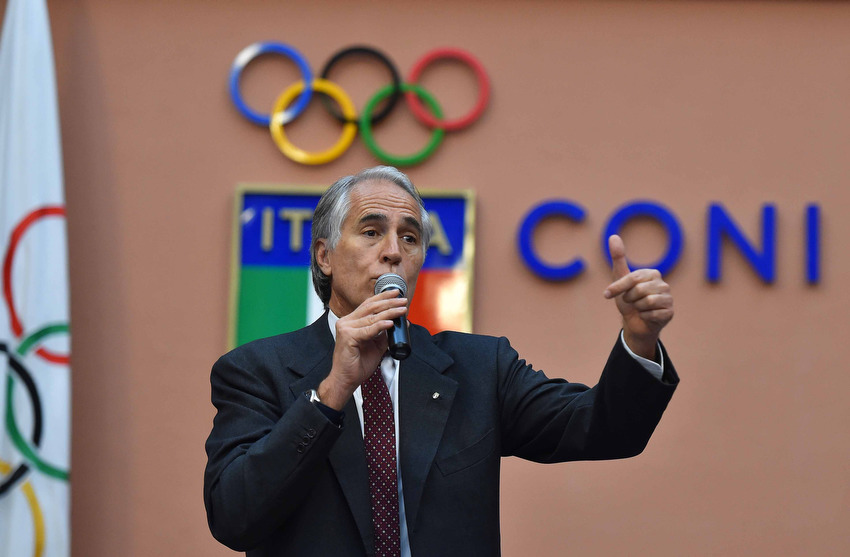
"We each have a reservoir of credibility. A year from now I should not have to be here to talk about the same things because it would mean that what I promised to do has been unsuccessful. Around the table there are the stakeholders in this world. I think that the working group should be adapted with some new professionalism from the indisputable curriculum but I want to remember what I've done since I was elected on this matter: if I didn't want problems I could confirm the professionals who took care of the matter. Yet I have changed, choosing the curriculum, not for knowledge. I have no relationship of any kind with them and this shows how this body is autonomous: it does not have and should not have any relationship of connection with CONI. I do not deny that I am going through a drama with the situation of Carolina Kostner. I cannot express solidarity to her and I deeply regret this, I have said it is not advisable because it could be misunderstood. The prosecutor calls for four years and three months: I was challenged for this decision. I think that is unfair. Because what WADA is saying is enlightening, until 31 December 2014, the Regulation requires this. From 1 January 2015, this discourse will change, according to the rules approved in the last Board. As a citizen I can say that it is unfair, as President of CONI I must remain silent. But what has CONI done wrong? Having complied with the regulations. And you have to judge the governance of CONI from the election day to today, you can't mix it up with the past. At the next conference I will invite others, to show that there is an opportunity to be heard and for criticism".
The introduction of Malagò preceded the intervention of Tammaro Maiello, Head Attorney of the Anti-doping Prosecution Office of CONI. "The Prosecution is a great team. International legislation to combat doping aims to ensure the credibility of the events and the health of the athlete. The phenomenon is combated, in Italy, with two actions: penal and sporting. The combating action passes from a static investigation activity to a dynamic activity, in particular for trafficking or attempted trafficking of substances (2.7) and for the administration of, or attempts to administer prohibited methods or encouragement, assistance and complicity in the violation of (2.8). Interaction with the public prosecutors and with the NAS (Medical Arm of the Carabinieri) is essential: we can not act only on hearsay, we have to acquire reliable data. We have evaluated audition techniques today detailed questions are prepared on the basis of thorough reading of the acts. In this context, we also utilised the use of the questionnaire with people abroad. Referrals section. From 1 July 2013 to 30 June 2014 116 referrals were prepared, in the last five months at least 103. The sample stated is not only pursued but also the subject that goes in the gyms. Doping is not fought only with the appearance of sanctions but also with prevention. That which helps the athlete to be aware of the rules. And it is also decisive the information activities and the involvement of young people".
The conference continued with the report of the General Cosimo Piccinno, Commander of the Carabinieri for the protection of health. "Our section consists of 38 centres distributed around Italy. We have a central department, we deal in particular with anti-doping and with pharmaceuticals by means of a strong international cooperation. Behind the supply chain of counterfeit drugs there is criminality because the revenues are enormous. One euro invested on one narcotic repays 16 times, on drugs 2,500. The turnover assessed is 50 billion a year. Doping is a criminal offence that seriously damages health. It is the dark side of sport. Law 376/2000 the CVD is established, in 2008 we start to deal with doping and in we appoint a representative in the commission. Today the planning of the controls takes place with targeted selection, from January 2013 thanks to the activity of qualified soldiers with "Anti-doping investigative Inspector" masters. This is the data: 4397 reported, 612 arrested, over 2 and a half million vials confiscated. With indications from the NAS the positive percentage rises from 2% to about 13%, which means doing intelligence work. It is necessary to make counter communication starting from the knowledge of the facts".
Roberto Cucchiari, Deputy prosecutor of the Prosecutor's Office of Rome, spoke about the organisation of the body. "The Prosecutor of Rome is divided into 14 specialised groups. The matter of doping is treated in a specific way, with a Prosecutor and 7 assistants. It collaborates with the NAS of the Carabinieri". Massimiliano Rosolino, Olympian swimmer, brought his contribution as an athlete. "For us one of the most beautiful thing is to be visited by those who do the testing, as this stands for credibility. Clean sport should be promoted. We must educate young people to eat well, to train with the spirit of sacrifice and application, to believe in fair play. In Italy we are very strict, the last episode of the Chinese swimmer teaches us that international harmonisation is useful. We should do anti-doping immediately after the competition, meaning the day after the award ceremony".
The topic of the conference was then addressed from the point of view of Carlo Polidori, President of Section I of the National Anti-Doping Court (TNA). "We deal with repression but I wanted to focus my speech on deterrence and information. The bodies of justice must speak through decisions, not through other means. We do not deal only with athletes found positive, indeed, those cases are simple. In our rulings we have started to emphasize the poor education there is in Italy on the phenomenon of doping. At the moment, it is a mission: I have two children and I would like to leave a world where you can race on equal terms. It should be maximum severity from the supervisory organisations and not only from those administering the tests". Luigi Fumagalli, President of Section II of the TNA, has on the other hand focused on the relationship between national bodies and supranational justice. "The Global WADA Code is the beacon of light. It was considered an added value to have a unified legislation. The division among athletes of national and international interest is important. The appeal to the Court of Arbitration for Sport (CAS) is expected in the second case. CONI has decided to grant this possibility to all athletes. Interesting case of the German skater Pechstein". Marco Bernardi, President of the Anti-doping Commission CIP, finally closed the morning session. "Even in this world there is doping, the big difference between the various disabilities determines the complexity of the phenomenon within the movement".
THE SECOND PART
The afternoon session, chaired by CONI Secretary General, Roberto Fabbricini, was opened by Lucio Nobili, Chairman of the Control Committee. "Our body provides the planning and distribution of the controls, during and outside competitions. It may also arrange surprise checks or their convocation. Decisive use of ADAMS, which allows the use of a uniform system, both nationally and internationally, of information management on the "whereabouts", as well as the rationalisation of targeted checks through the medium of the verification in the database of the history of sampling sessions already made by other anti-doping organisations on the same athlete". Luigi Frati, President of the CEFT, outlined the activities of the other CONI anti-doping facility. "The CEFT obviously follows international rules. The general criteria requires that medicines administered are closely related to the pathology and our facility certifies the appropriateness of the treatment. The problem consists in staying within the rules and in this sense we use the utmost rigour. We do not authorise competing within the term of the presumed effect of the treatment. The exemption must be requested first. If there is an emergency, the request is evaluated on a case by case basis".
Massimo Casciello, President of the CVD, spoke of its system. "The goal is to see how the problem of public health and combating doping at the same time in competitions is experienced. To provide training and information to the general public through new forms of communication We have conducted studies with the Ministry of Health to assess the components of the supplements on the market and to protect, of course, citizens. We fund research activities: 1390 athletes tested in 2013".
Maurizio Casasco, President of the FMSI, spoke about the activity carried out. "I wish to thank all of the partners that are part of the anti-doping system. The CEFT is extremely important, it is rigorous, it is the real hub - present and future - of anti-doping. The FMSI was founded in 1929 and has 5,000 members. We protect the health and guarantee the health education of those who do sports. The selection is very hard to obtain the status of DCO (Doping Control Officer). Since 2006, things have changed. In Turin in 2006 they were 62 of our doctors involved, obtaining zero non-compliance. We are proud and I want to stress that, in the context of our competencies, using ADAMS is a resounding advantage. You are able to retrieve the athlete, to know where they are. I have to thank Malagò who spoke with the State to allow it use".
Gualtiero Ricciardi, Commissioner of the Italian Institute of Health, outlined the activities of the currently chaired body. "We operate through monitoring activities, which take place in different areas, ranging from minor to professional ones. We check that the laboratories meet the minimum requirements and we also cooperate with the activities of the CVD. We try to also act on raising awareness concerning the taking of drugs, with a national mapping of the supply and an analysis of the products, in collaboration with NAS. Our work is also to develop awareness campaigns on the subject, by trying to promote virtuous models. We are accessible to citizens, for an effective interaction with the purpose of prevention".
Francesco Botrè, Director of the Anti-Doping Laboratory in Rome, with a brilliant speech touched on the key points related to the activity of the structure. "The World Anti-Doping Program is structured on three levels, the first two are mandatory, the third covers models of good practice. In the first two models, there are standards on the list of prohibited substances. I am also on the Controls committee of this list, there are only two belonging to the laboratories (also that of Cologne). Synonymous with recognition of our work, including that regarding the identification of new substances. Today there are over 400, there were 250 at the end of the century, 10-20 in the 1960s. The laboratory in Rome was re-credited from 1999. Competence, autonomy and traceability are the criteria for performance evaluation: we oversee the National Institute of Health, the National Board of Accreditation and then WADA. Statistical data: in 2013 the index of positivity of the Laboratory was 2.83%, compared to 2.21% worldwide. We have brought a significant contribution to the activity in the development of methods of pre-treatment of the sample with the use of microwaves, improvement of the method for the detection of doping by erythropoietin, development of methods applicable to both blood and urine for doping by hormones". Damiano Tommasi, AIC President, analysed the problem as a former athlete and manager. "The problems arise from the superficial use of medicines, from too much faith in some systems, children of an erroneous culture. Our job as managers, to train more and more. I refer also to the relationship with the doctors, of the RTP. A medal that is not clean must become a disadvantage. I know how hard it is to give up a competition, but health comes before everything and I am happy that there are people who have given up playing to avoid the risks of infiltration".
THE CONCLUSION
The third and final part of the conference was initiated by the participation of the Attorney Gambino, on the output of the new CONI magazine on Sport Law. The Head of the CONI Press and Communications Office, Danilo di Tommaso, illustrated aspects of communication linked to doping. "An imperative task, such as sports anti-doping regulations, it is linked to the disclosure of some news: throughout the handbook the website address CONI is cited 11 times. The most important part is related to the communication of court rulings, not to mention the publicity given to the suspension of procedural deadlines". Luigi Ferrajolo, USSI President and member of the Control Committee spoke on the other hand about recent professional experience. "It is a role which I have to adapt to responsibly. To see the matter from the other perspective, however, helps to better understand certain dynamics". Giovanni Bruno, Director of Sky Sports and also a member of the Control Committee, is on the same wavelength. "I've got to be part of something that I have always seen from the other side. We test a lot more athletes, thanks to the knowledge of the sporting world, of current events". Malagò closed the proceedings, noting that there will be another meeting open with other interventions and stressing the importance of an ongoing dialogue aimed at constantly improving the anti-doping model.
Literary, Sports and Journalistic Contests Awards Ceremony. Malagò: "Hope for the young"
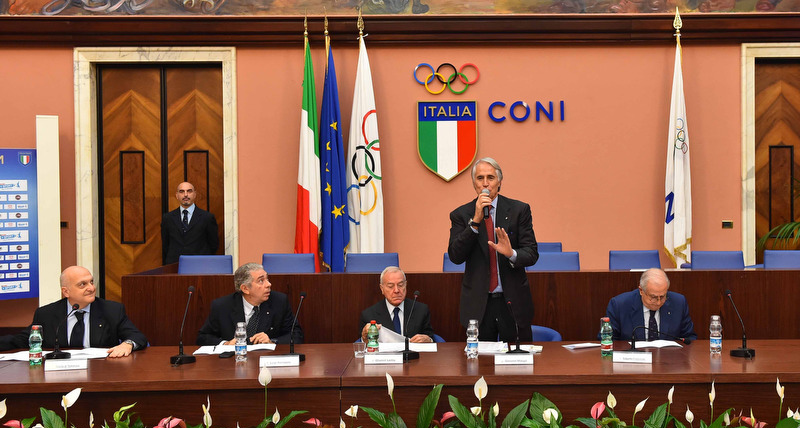 The usual annual awards ceremony for CONI-USSI Literary, Sports and Journalistic Contests was held this morning in the Hall of Honor of CONI. The meeting was opened with a greeting by Giovanni Malagò, who attended the event along with the Secretary General, Roberto Fabbricini. The Examination Committees were represented by the President of the 43rd Competition, Gianni Letta, and USSI President, Giovanni Ferrajolo. Due to a sudden family problem, the President of the 48th Literary Contest, Walter Pedullà, had to leave the Hall of Honor before the start of the ceremony: however, he left a detailed and valuable written account containing the reasons for the choices made for the three sections' winners.
The usual annual awards ceremony for CONI-USSI Literary, Sports and Journalistic Contests was held this morning in the Hall of Honor of CONI. The meeting was opened with a greeting by Giovanni Malagò, who attended the event along with the Secretary General, Roberto Fabbricini. The Examination Committees were represented by the President of the 43rd Competition, Gianni Letta, and USSI President, Giovanni Ferrajolo. Due to a sudden family problem, the President of the 48th Literary Contest, Walter Pedullà, had to leave the Hall of Honor before the start of the ceremony: however, he left a detailed and valuable written account containing the reasons for the choices made for the three sections' winners.
President Malagò opened the day stressing "the goodness of awards among the other inherited good things. I have always had respect for the category, even when I get intellectually honest criticism. I appreciate this ceremony, which gives hope to the new generations even in light of the current difficulties". Malagò finally addressed a final, emotional farewell to all the journalists who died in 2014, devoting a special thought to Marco Ansaldo's and Oscar Orefici's families, who attended the event to collect the awards dedicated to the memory of those two unforgotten champions of the category.
Gianni Letta introduced his speech with a tribute to President Malagò "for his passion, his courage and his conviction in carrying out his program, and also for the commitment that earned him the presidency, almost two years ago". Letta then expressed his satisfaction with the numbers of the Competition: the stories submitted were 75 (plus 65 stories for the Under-18 category), while in the previous contest there were just 18. "The average quality of the productions has greatly improved and I must say that the winner, Mariano Graziano, and the 2nd place, Roberto Gerace, have produced passionate and pleasant works. "9:58" is the summary of a life marked by sporting events, while "Scupetta" reflects the perception of sport in social problems through the story of a boy who becomes a football player". Letta also addressed compliments to the young Under-18 participants for the quality of their works, stressing that this competition "represents a way to introduce young people to sport and give confidence in the future of the country."
The evaluations of the President of the Literary Contest, Walter Pedullà, on the prizes awarded, were read by Danilo di Tommaso, CONI Chief Communications Officer. "The biggest surprise of this year for me came from non-fiction, while in the past I have learned more from the technical section. Once investigations were conducted with the naked eye, while now there are more sophisticated technological tools, as highlighted by this year's excellent works. The protagonists in fiction were the memory of the world hour record by Fausto Coppi, narrated in a style between news and fantasy, and the memories of an athlete still in business, while the special mention was assigned to the book on the adventures of Nesto Bordesante. The non-fiction works did not miss the opportunity to celebrate the "unforgettable" Cesare Rubini, while the first prize was awarded to a volume that explores the relationship between sport and philosophy, in an organic, deep reflection".
Luigi Ferrajolo, President of USSI, opened the prize-giving for the Journalistic Contest, apologizing for a digression in which he recalled the difficulties that the industry is facing through some data related to lost jobs and the early retirement of many professionals. "It is a crisis that concerns not only employment but also the professional role." Ferrajolo then devoted an emotional farewell to Marco Ansaldo and Oscar Orefici, giving way to the awards.
XLIII National Contest for Sports Stories
1st Prize: Marino Graziano, "9:58"
2nd Prize: Roberto Gerace, "Scupetta"
Under-18 category
Honor Plate: Rossella Lembo, "Lottare per un sogno"
Special Mention: Alessia Serluca, "Tema"
XLVIII Literary Contest
Fiction
1st Prize: Mauro Colombo, "L'ora del Fausto" (Ediciclo ed.)
2nd Prize: Max Di Franco and Lillo Cafieri, "Il bambino che sogna" (Galassia Arte)
Special Mention: Stefano Marelli, "Altre stelle uruguayane" (Rubbettino ed.)
Non-fiction
1st Prize: Giovanni Boniolo, "Le regole e il sudore" (Raffaello Cortina ed.)
2nd Prize: Oscar Eleni and Sergio Meda, "Indimenticabile (Sport & Passione)
Technical
1st Prize: Nunzio Lanotte and Sophie Lem, "Sportivi ad alta tecnologia" (Zanichelli)
2nd Prize: Vincenzo D'Onofrio, "La camminata" (Calzetti Mariucci ed.)
CONI-USSI 2014 Journalistic Contest
CONI-USSI Award "Under-35": Francesco Saverio Intorcia (La Repubblica)
CONI-USSI Award "Written Press-Society and Investigation Journalism": Giorgio Viberti (La Stampa)
CONI-USSI Award "Written Press-News and Technical Journalism": Andrea Santoni (Corriere dello Sport-Stadio)
CONI-USSI Award "Multimedia": Gianluca Pasini (La Gazzetta dello Sport)
CONI-USSI Award "Desk-Written Press": Mario Celi (Il Giornale)
CONI-USSI Award "Desk-Television": Fabio Tavelli (Sky Sport)
CONI-USSI Award "Television": Donatella Scarnati (Rai Sport)
Special award in memory of Marco Ansaldo
Special award in memory of Oscar Orefici
CONI Award "A Pen for Sport – Memorial Giorgio Tosatti": Enrico Maida
Malagò awarded with Laurentum Special Prize "Values of Sport"
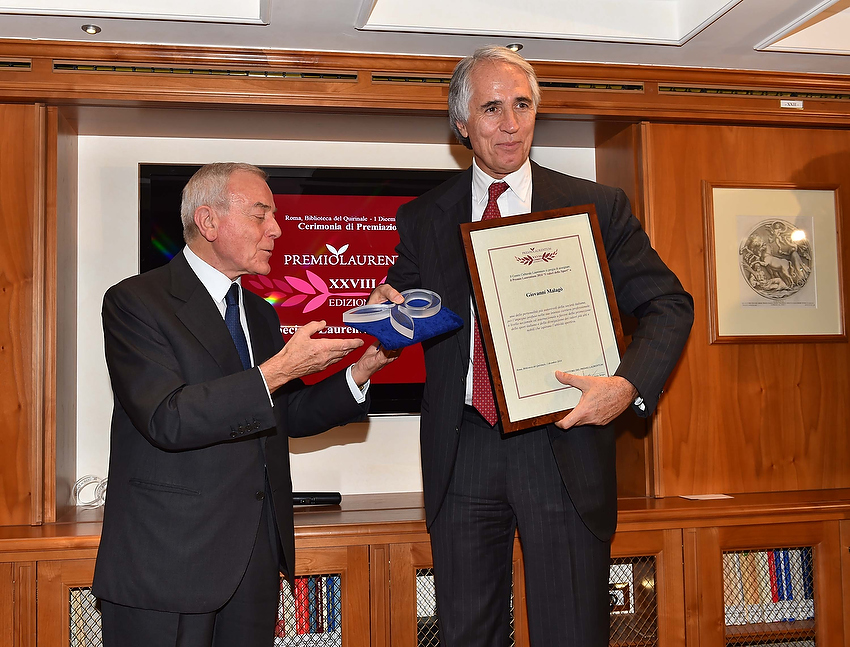 The President of CONI Giovanni Malagò has been awarded today in the library of the Quirinale with the Special prize "Values of Sport", established this year by Laurentum Poetry Awards. While having a predominantly cultural vocation, the recognition aims to celebrate the values that contribute to a healthy physical and athletic training and that require the teaching and the assimilation of the spirit of sacrifice, loyalty, fairness, and respect of the opponent, so desperately needed in a modern society where athletes are role models for the new generation.
The President of CONI Giovanni Malagò has been awarded today in the library of the Quirinale with the Special prize "Values of Sport", established this year by Laurentum Poetry Awards. While having a predominantly cultural vocation, the recognition aims to celebrate the values that contribute to a healthy physical and athletic training and that require the teaching and the assimilation of the spirit of sacrifice, loyalty, fairness, and respect of the opponent, so desperately needed in a modern society where athletes are role models for the new generation.
As stated in the citation, Laurentum Cultural Center "is pleased to award this Prize to Giovanni Malagò, one of the most influential personalities of Italian society, for the effort in his intense career at national and international level aimed to the promotion of Italian sport and the spreading of the highest, noble values that inspire sport".
The Laurentum Awards are one of the main Italian literary competitions, the first ever in terms of membership, with more than 70,000 participants in the various initiatives in the last five editions. The Committee of Laurentum Awards is composed, as well as by President Gianni Letta, by Angelo Bucarelli, Corrado Calabro, Maurizio Cucchi, Stas' Gawronski, Simona Izzo, Raffaele La Capria, Mauro Miccio, Maria Rita Parsi, Davide Rondoni and Roberto Sergio.
2014 WINNERS
6th CAREER AWARD
Adriana Asti
8th VALUES OF CULTURE AWARD
Lina Wertmüller
4th DANTE ALIGHIERI AWARD
Giampiero Neri
1st VALUES OF SPORT AWARD
Giovanni Malagò
Malagò and the Minister Lorenzin awarded with 2014 "Auguste and Marie Krogh" medals
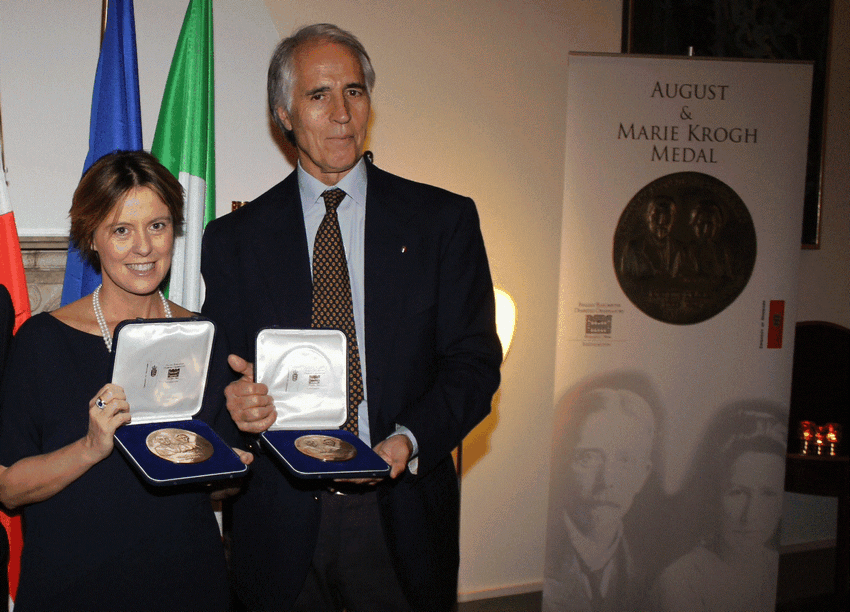 The President of CONI, Giovanni Malagò, and the Minister for Health, Beatrice Lorenzin, received this afternoon "August and Marie Krogh" Medals, during a ceremony at the residence of the Ambassador of Denmark in Italy, Birger Riis-Jørgensen. The prestigious prize, awarded annually by a panel set up by the Italian Barometer Diabetes Observatory (IBDO) Foundation, is awarded to personalities in Italian scientific, economic and social fields, who "have helped with projects and social and cultural activities or those of innovation and research, in the development of health in general and diabetes in particular".
The President of CONI, Giovanni Malagò, and the Minister for Health, Beatrice Lorenzin, received this afternoon "August and Marie Krogh" Medals, during a ceremony at the residence of the Ambassador of Denmark in Italy, Birger Riis-Jørgensen. The prestigious prize, awarded annually by a panel set up by the Italian Barometer Diabetes Observatory (IBDO) Foundation, is awarded to personalities in Italian scientific, economic and social fields, who "have helped with projects and social and cultural activities or those of innovation and research, in the development of health in general and diabetes in particular".
The 2014 award was given to the President Malagò and the Minister Lorenzin "for the personal and institutional commitment to promoting healthy lifestyles, fundamental in the prevention of chronic diseases, and in particular to the Minister Lorenzin, for the action of raising awareness of European colleagues during the Italian Presidency of the European Council", explained the president of the jury, Mr Renato Lauro, President of the Italian Barometer Diabetes Observatory Foundation.
Prosecutor's Office refers Carolina Kostner, demands 4 years and 3 months disqualification
 Anti-Doping Prosecutor's Office referred the athlete Carolina Kostner (FISG affiliated) to the Second Chamber of the National Anti-Doping Tribunal of CONI for the recognition of liability upon the violation of Art. 2.8 and 3.3 of Anti-Doping Sports Policies, on the basis of the documents sent by the Public Prosecutor of Bolzano - within the inquiry called "Olimpia" and the outcome of the investigations carried out by the Anti-Doping Prosecutor's Office in the field of sports, with demand for 4 years and 3 months disqualification.
Anti-Doping Prosecutor's Office referred the athlete Carolina Kostner (FISG affiliated) to the Second Chamber of the National Anti-Doping Tribunal of CONI for the recognition of liability upon the violation of Art. 2.8 and 3.3 of Anti-Doping Sports Policies, on the basis of the documents sent by the Public Prosecutor of Bolzano - within the inquiry called "Olimpia" and the outcome of the investigations carried out by the Anti-Doping Prosecutor's Office in the field of sports, with demand for 4 years and 3 months disqualification.
Page 91 of 126


